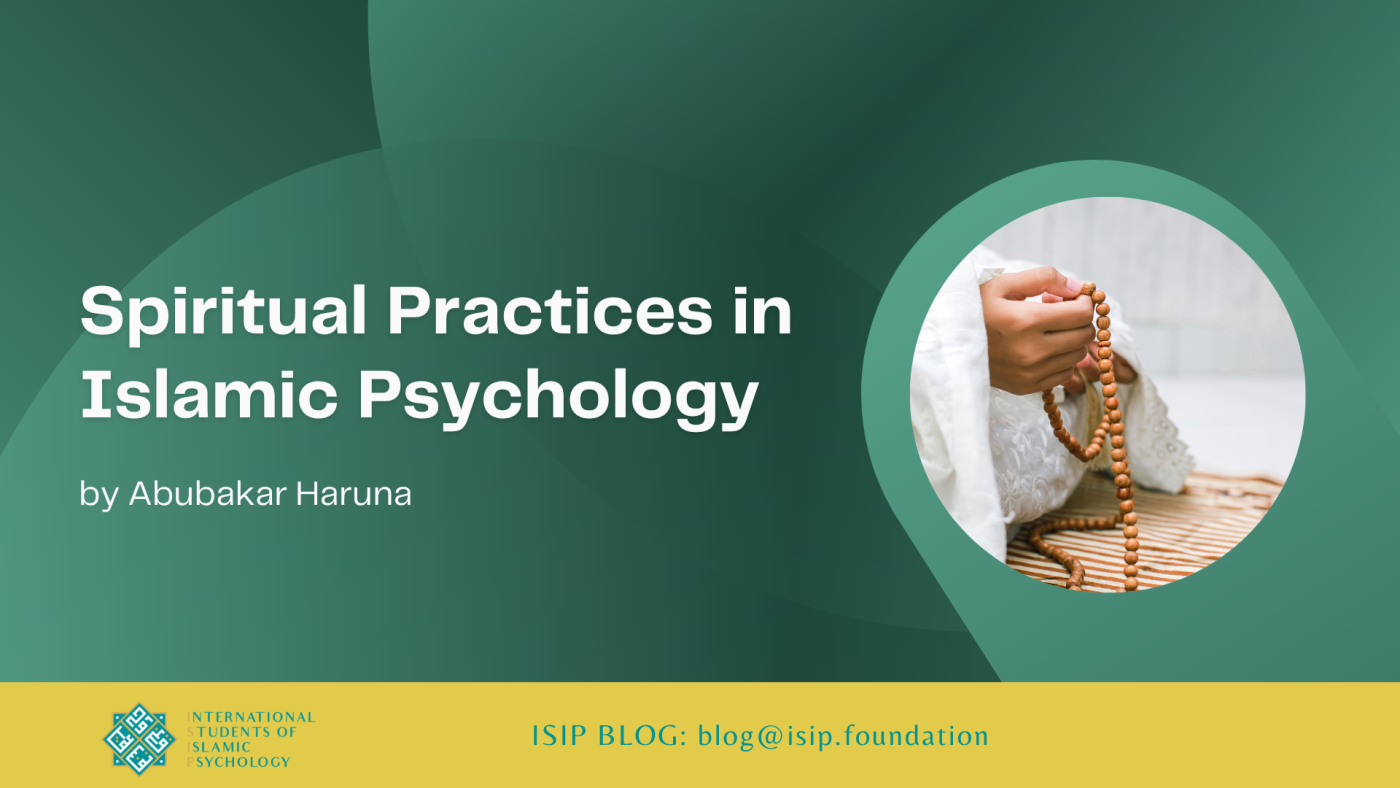
by Abubakar Haruna
Spiritual practices have an important history, recognition and relevance in psychology. They promote well-being, personal growth, and resilience in human beings. There are various practices that promote the psychological well-being of people, inner peace and social discomfort. Most psychological theories and frameworks explicitly incorporate these practices (to be noted below) but there is an increasing acknowledgement of the significant impact of spiritual practices on mental health. Here are a few examples of spiritual practices within psychology. They include mindfulness meditation, gratitude practice, loving-kindness meditation, prayer and yoga.
In Islamic psychology, spiritual practices are built upon Islamic teachings and traditions of the Prophet Muhammad (peace and blessing be upon him). The main aim of such practices is to promote psychological well-being, inner peace, and a closer connection with almighty Allah. Some examples of spiritual practices from the Quran include salah (prayer), tawbah (repentance), dhikr (remembrance of Allah), fasting, sadaqah (charity) and sabr (patience).
Salah (Prayer):
The five daily Salah is the obligatory prayer performed by all good Muslims. The prayer involves performing ablution before the start of the actual prayer, making intention, attention, physical movements, recitation of Quranic verses, and supplications. The five daily prayers include Subh (two rakaah in the early morning), Zuhr (four rakaah at noon), Asr (four rakaah at noon), Magrib (three rakaah at early night) and Isha (four rakaah at night). The main importance of prayer (salah) is establishing a direct connection and relationship with Allah, seeking His guidance, and finding tranquillity in His remembrance. According to the Quran (29:45), Allah commanded the Prophet Muhammad (SAW) “Recite what is revealed to you of the Book and establish prayer. Indeed, prayer prohibits immorality and wrongdoing, and the remembrance of Allah is greater. And Allah knows that which you do.”
Dhikr (Remembrance of God):
Means remembrance of Allah through the repetitive recitation of His name, verses from the Quran, or phrases praising Him. It is believed to elevate one’s spiritual state, increase mindfulness of God’s presence, and cultivate inner peace. Quran (13:28) “Those who have believed and whose hearts are assured by the remembrance of Allah. Unquestionably, by the remembrance of Allah, hearts are assured.”
Tawbah (Repentance):
Seeking forgiveness from Allah for the sins humans committed and abandoning them forever. It’s a means of purifying the soul and spiritual healing. In tawbah one acknowledges wrongdoings, regret, feeling remorse, and making a sincere intention to rectify one’s behaviour. Here is the reference from Quran on tawbah, Quran 66:8 “O you who have believed, repent to Allah with sincere repentance. Perhaps your Lord will remove from you your misdeeds and admit you into gardens beneath which rivers flow [on] the Day when Allah will not disgrace the Prophet and those who believed with him. Their light will proceed before them and on their right; they will say, ‘Our Lord, perfect for us our light and forgive us. Indeed, You are over all things competent.'”
Sadaqah (Charity):
Brings blessings and increases the spiritual well-being of people. Sadaqah is an act of charity that refers to voluntary giving to the needy. It is believed to purify our wealth, increase our compassion, and foster a sense of gratitude. The Quran emphasised the significance of sadaqah in Quran (2:262), Allah says “Those who spend their wealth in the way of Allah and then do not follow up what they have spent with reminders [of it] or [other] injury will have their reward with their Lord, and there will be no fear concerning them, nor will they grieve.”
Sabr (Patience):
Sabr is the act of practising and exercising patience and perseverance in adversity, trials, or hardships. It involves maintaining a calm and steadfast attitude, trusting in God’s wisdom and plan, and seeking His support during difficult times. Sabr is considered a virtue that helps individuals develop resilience and inner strength. Quran (2:153)
“O you who have believed, seek help through patience and prayer. Indeed, Allah is with the patient.”
Seeking knowledge:
Seeking knowledge is essential in Islam. The first thing Allah revealed to the Prophet (SAW) was “Iqra’!” (Read), which means seek knowledge. The Prophet Muhammad (SAW) emphasized seeking knowledge, especially Islamic knowledge. He said, “Seeking knowledge is obligatory upon every Muslim.” Muslims are encouraged to seek knowledge throughout their lives, including the study of the Quran, Hadith, Islamic jurisprudence, and other beneficial fields. Acquiring knowledge helps individuals develop a deeper understanding of Islam, strengthen their faith, and enhance their spiritual growth. Other fields Muslims need to seek knowledge include knowledge that will develop their social life and economic strength.
Fasting:
Islam emphasized the importance of fasting as a means of attaining spiritual purification and closeness to Allah. Fasting is abstaining from eating, drinking and having sexual intercourse from dawn to sunset and it’s a shield against the Hellfire. It is normally performed during the month of Ramadan. Fasting helps develop self-control, empathy for the less fortunate, and a stronger sense of spirituality. In this month, Muslims engage in extra prayers and other good deeds to get more rewards from Allah. The Night of Power (Lailatul kadir) is witnessed during one of the nights in this month.
In conclusion, spiritual practices help individuals to develop closeness to almighty Allah and move away from the serpent’s influence. Islam promotes all spiritual practices to sharpen the positive behaviours of people. It’s better for parents and caregivers to emphasise such practices to have a purifying society.
References
Kabat-Zinn, J. (2003). Mindfulness-based interventions in context: Past, present, and future. Clinical Psychology: Science and Practice, 10(2), 144-156.
Emmons, R. A., & McCullough, M. E. (2003). Counting blessings versus burdens: An experimental investigation of gratitude and subjective well-being in daily life. Journal of Personality and Social Psychology, 84(2), 377-389.
Masters, K. S., & Spielmans, G. I. (2007). Prayer and health: Review, meta-analysis, and research agenda. Journal of Behavioral Medicine, 30(4), 329-338.
Quran 29:45
Quran 13:28
Quran 66:8
Quran (2:262)
Quran (2:153)
